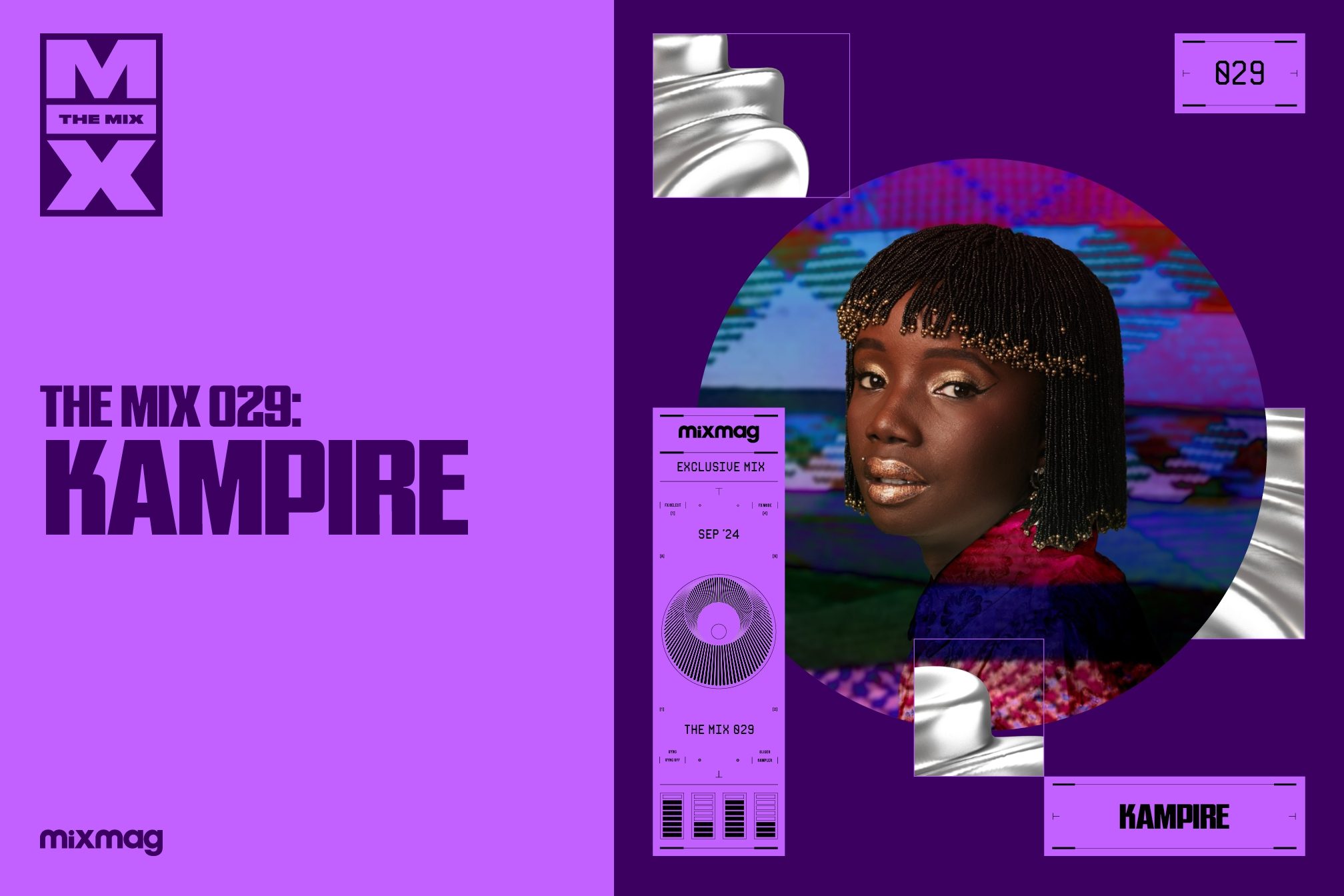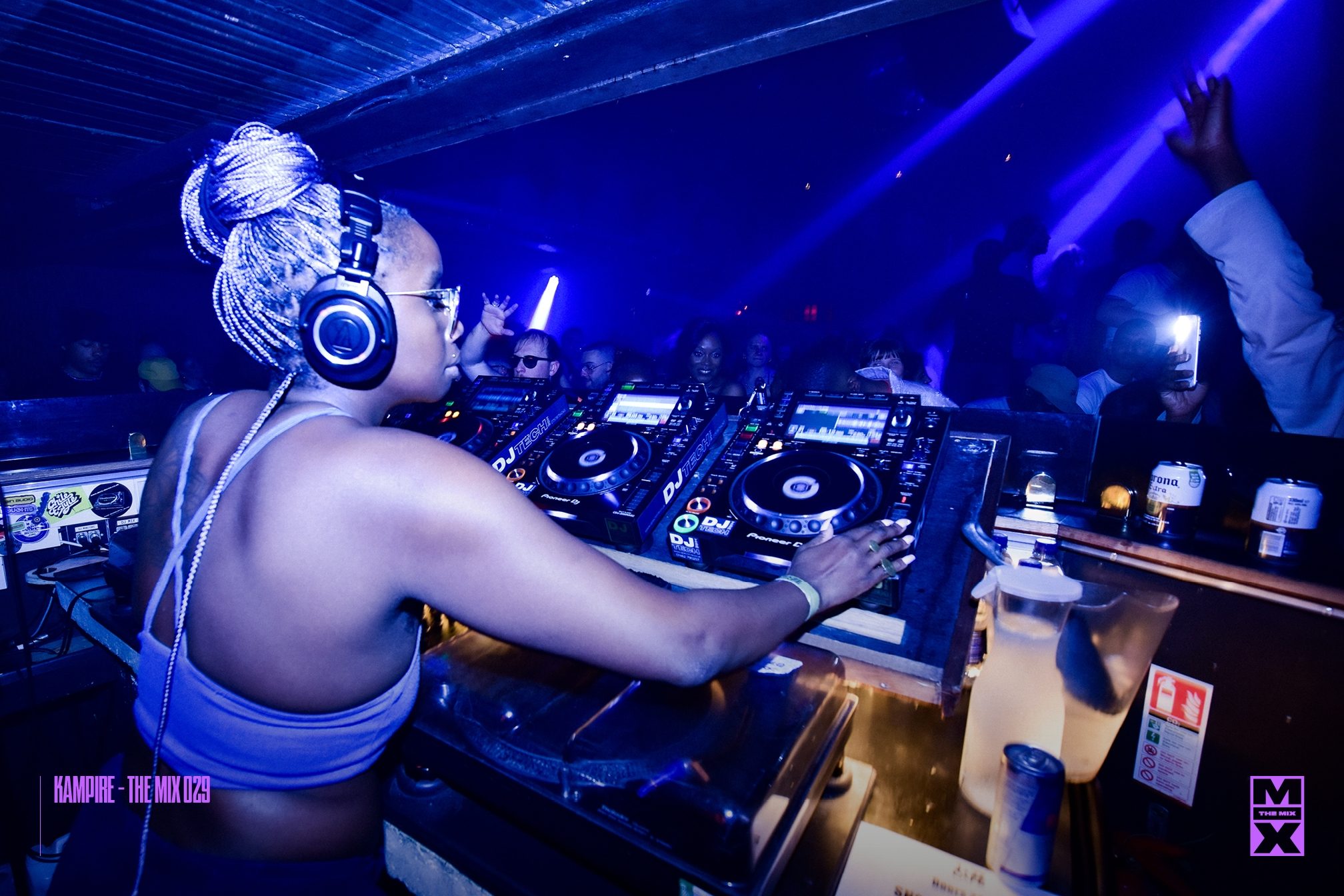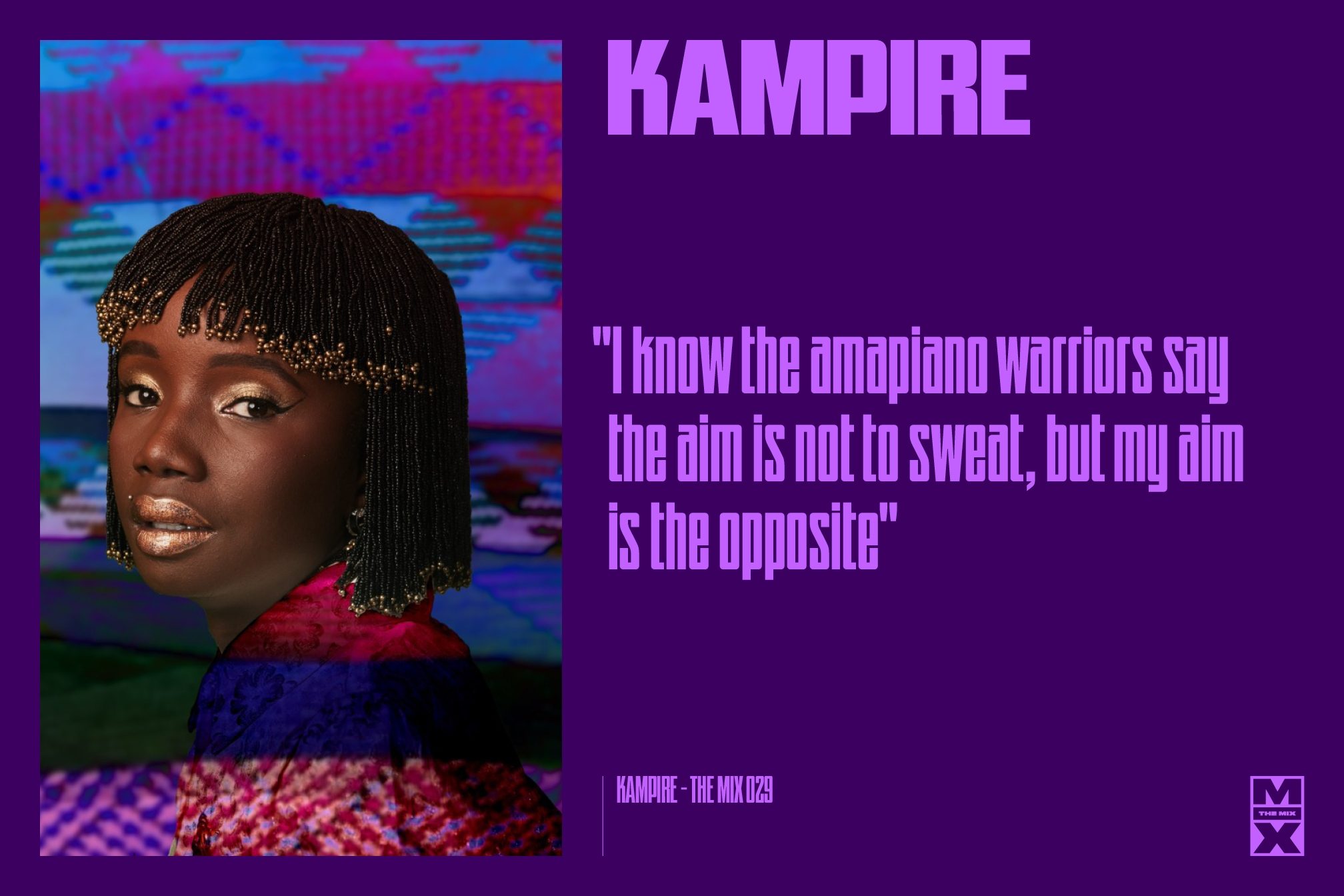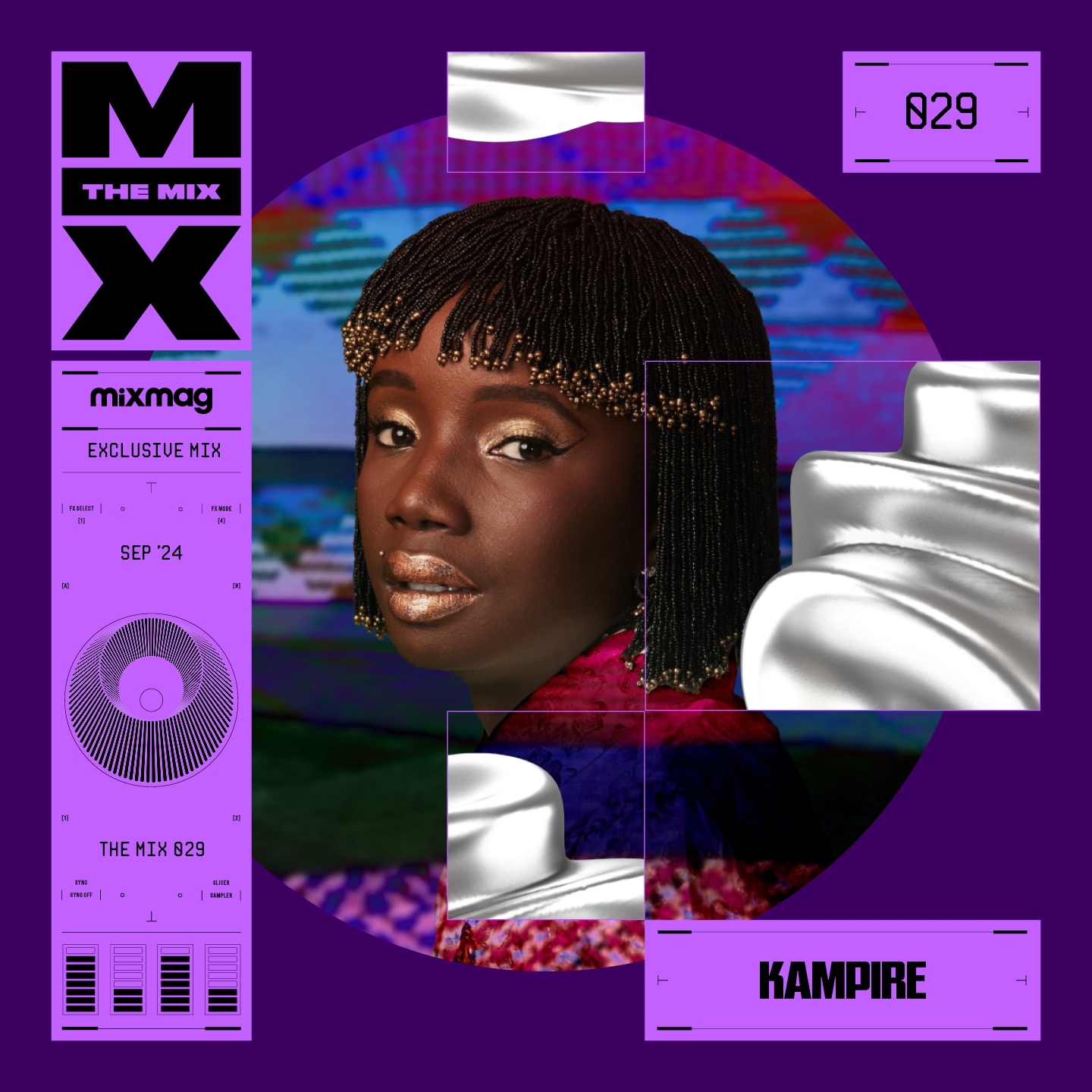 Music
Music
The Mix 029: Kampire
Kampire shares a mix evoking the past and future of African dance music and speaks to Shirley Ahura about her debut compilation, elevating women in music, and making dancefloors sweat
Kampire knows how to keep an expert ear to the underground. Typically, her sets double up as odes to the cerebral sounds of the African continent and diaspora; from the guttural gqom and colourful kwaito that reside in South Africa to bunda-shaking Brazilian baile funk. Skillfully, she takes you to the homes of dancing nations; be it francophone Congo or lusophone Angola. Leapfrogging from her decks are the portmanteaus of sounds both past and present: Kenyan gengetone. Ugandan dancehall. Genres-within-genres layered with care and precision under her dexterous hands, reading like love letters to all the genres that came before them.
Hailing from Uganda by way of Kenya and Zambia – and going very much by “Kampi-reh not Kampaya” as stated in her deliciously tongue-in-cheek IG bio – Kampire is one of the most dynamic DJs to come out of the African continent in recent years. The diasporic divergence in her selections have become a major trademark, propelling her to international acclaim and glory on some of the biggest stages on the planet, and landing her in Mixmag’s Top Breakthrough DJs and then Top DJs Of The Year lists in 2018 and 2023 respectively. Whether you’re experiencing her live at London’s Jazz Cafe, Barcelona’s Sónar Festival or in a sweaty Boiler Room sesh in Mumbai, you get that feeling that somehow, somewhere in time, space or even another life, you’ve been here before. “I love that feeling of shared nostalgia where people recognise a song they haven’t heard in a long time. It’s a touchstone for me when I’m playing.” Kampire says.
Read this next: 17 women shaping African dance and electronic music
Braided fringes adorned in gold beads. Pearl necklaces and puffed-up shoulder pads. Cassette tapes. Oversized waist belts. Electric pink eyeshadow. No one does a revival quite like Kampire. The same post-disco paraphernalia found swirling around the cover art of her debut compilation, 'A Dancefloor In Ndola', can be felt soundscaping all 13 of its tracks. Nostalgic and nomadic in spirit, the collection is a rich tapestry of East and Southern African sounds from the '70s and '80s, showcasing a sumptuously golden era of Congolese rumba and soukous, Mzansi township bubblegum and Zambian kalindula.
Curated and compiled by the East African DJ in collaboration with Strut Records, the project is part-digital archive, part-treasure chest and full-on in the deja vu department. It’s also somewhat of a utopian manifesto for Africa’s ‘Lost Decade’, a period coined in part due to a perceived reversal of gains made during the post-Independence years. Documenting such an innovative time in Africa’s history – a history that has for so long been discredited as provincial, inert or even unsophisticated – Kampire leads an uptempo march towards a pan-African vision, replete with new and exciting freedoms both social and sonic. “If I'm playing music from Brazil or St. Lucia and there’s a specific rhythm that reminds me of Angolan kuduro, that kind of thing really excites me. In my sets, I like to make those connections clear. I think that’s one of the cool things about DJing. It’s about telling those stories in a way that's not in words or books. It's through an embodied musical experience.” she observes.
This style is audible in her instalment of The Mix, which evokes the past and future of African dance music. Our video call finds her talking ahead of a performance at London's All Points East – pitstop number two in the European leg of her multi-city, cross-country tour.

Other than your name not being pronounced as ‘Kampaya’, what else should people know about you?
I'm a DJ, occasionally an artist. I like to think of myself as a connector in all the other aspects of my professional life. I’m based in Kampala, Uganda. I play all kinds of genres of African electronic music and music from the African diaspora. I’m one of the crew that founded the Nyege Nyege Festival way back in 2015. And I just put out this compilation.
If you could be born in the best era for African music, when would that be?
A lot of my favourite genres peaked in the '80s and '90s. So like, my favourite Congolese soukous tracks are definitely from the '90s, where they were a bit more upbeat and there were all these crazy music videos that went with them. As a '90s baby who came of age with the internet, I miss those simpler times. We were benefiting from new technology and new connectivity – but it hadn't entirely taken over the way it has today.
What genre is getting you most excited at the moment?
I'm very obsessed with gqom. I like quite dark, melodic stuff, which isn't always appropriate. I'll be playing in the afternoon, and I'm like…can I squeeze in a gqom track? That kind of genre is really best for dark clubs at three in the morning. And I really gravitate to it.
What are the perfect ingredients for a Kampire set?
Ultimately, the aim is just to get people to dance. I know the amapiano warriors say the aim is not to sweat, but my aim is the opposite. When I meet a dancer after I play, and their shirt is soaked in sweat, I know I've done the right thing.
Read this next: How sounds from the Global South stopped club culture stagnating
What’s been your favourite place to play in so far? Any on your wishlist?
I haven't been to Brazil yet, and it's very much on my list. I got to play in Shangai and Tokyo in 2018, which was crazy. I think the biggest privilege is being able to play on the continent. Nairobi has been giving me life lately, I always have a good time there. The crowds are super responsive to any kind of genre, and they also just really love to dance.
Why 'A Dancefloor In Ndola'?
I wanted to give people an idea of just how diverse the continent is. The genres sound different, but have similarities. It really is just a very tiny snapshot in time and space; with references to the music of my parents' generation and all the things that we danced to when I was a kid. It’s also good summer-y, sitting-in-the-grass type music.
There are several nods to femme fashionistas and mystique divas on this project. How do you see the role of women historically as curators of culture?
I think that women do all these magical things, but nobody gives it as much value because it's considered to be in the private space. But in the public domain, women are considered the carriers of culture. Even in soukous music – we hear about Franco, Tabu Ley, and less about all the incredible women vocalists who contributed to that culture. So when I made this list, I was like, where are the women? I think it's always important to kind of elevate them now that we know better.
What are some of your earliest memories of music growing up?
I spent most of my childhood, between the ages of two to 18, in Ndola – a small town in Zambia’s Copperbelt. At the time, Congolese music was the pop music of the whole of the African continent, but especially in East Africa. Being Ugandan, my dad was obsessed with Franco and all these Congolese artists – a lot of the tracks were nostalgic for my parents and represented a piece of home. At the same time there was a lot of South African influence in Zambia, mostly through Channel O which was like a South African MTV. And of course American R&B and UK pop, whatever was coming on the radio. In summary, it was a real melting pot.

How did you discover dance music?
When I was in university in the US, I got really nostalgic about African music. I remember listening to this one album, 'Black Diamond', by a Portuguese EDM group called Buraka Som Sistema. They used a lot of samples of '70s, '60s Angolan and Mozambican music that they had updated and made danceable. It sounded so familiar to me, just like soukous, or just very African. That’s what introduced me to kuduro, the foundation for my first DJ sets.
And how did that shape your musical palette as a DJ?
When I came back to live in Uganda, I knew kuduro would really go down well on the dancefloor. There’s a real culture of clubbing here – it's very dance based, hence why Ugandans love dancehall. Getting involved with Nyege Nyege and meeting all the young alternative producers who have come out of that scene really pushed me to play more weird and alternative sounds, and to not play it safe.
As an integral part of the collective, what are some of your hopes and dreams for Nyege Nyege?
The hope is that something like Nyege Nyege opens doors for other events and other possibilities. It should never be the ‘only’ or ‘best’ one. The dream is to always make it easier for other young Ugandan artists and creators to do their thing. I come out of a scene full of really talented and interesting and incredible East African musicians. I'm proud to represent that – it's what gives me meaning and a sense of place and community.
Following the recent anti-corruption movements, what would you say is the general sentiment right now for young Ugandans like yourself?
It's tough to characterise, because we've lived with such inequality and corruption for so long. We come from a very complicated history where we've never had a peaceful transfer of power, ever. There's a lack of accountability – people don't even know or recognise that a government is supposed to provide you with services. I think that’s really quite embedded in our culture. So, when you see the kind of uprisings that we've been seeing recently, it gives people some hope.
Read this next: "A tool for protest": DJs from the Global South are fighting oppression with music
And how do you see your music speaking to this generation, if at all?
I've never really thought about that! [laughs]. There's a lot of work to be done before I see things getting better, for sure. I guess I see myself as a small part in what is a rich and complicated history and culture – one that hasn't fully been documented or understood or appreciated. I'm privileged and happy that I can make my small contribution to that.
What’s one thing you would like clubgoers past present and future, to take away from your sets?
Hopefully, lots of dancing. It’s always important to be together in spaces with people that are different, instead of assuming the worst because of that difference. Living, dancing and socialising with people breaks down a lot of that. It gives you a window to how diverse and complicated and wonderful the world is.
Can you tell us about your mix?
I almost never stick to a single genre when I mix, gqom is the only music, with its cinematic soundscapes, that makes me want to attempt that. I'm a huge fan of South African music in general and it has had such a big impact on my style and taste that I had to include some South African tracks in the compilation 'A Dancefloor in Ndola'. I love that you can hear both the past and the future in genres like kwaito and amapiano, and gqom, of course is the perfect example of this. This set is a mix of tracks I've played on radio this year, and what I prepped for my set at Dekmantel Selectors in August. A big thanks as always to the producers who make such mind-blowing music. I hope you enjoy.
'A Dancefloor in Ndola' is out now via Strut Records, get it here
Shirley Ahura is a freelance writer, follow her on Twitter

Tracklist:
Chrisman - Gqom Eish
Kiing Bhutie (feat. Dj Emotic) - 8 Bullets
State OFFF - Soundbwoy Killa
DJ Anderson Do Paraiso (feat. Mc Pânico, Mc Magrinho, Mc Myres) - MTG Surtante do Queridão 2.0
Cwelzn x Nator x Tekzamusic - As’lalanga
Gqomknights - Street Bang
Ow’Waytee - Caves
DJ Lovers Uyayisusa Revo - Gqom Heist (Dombolo)
State OFFF - Nasty Gqom
Ms. Cosmo (feat. Blxckie, Kamo Mphela, RudeBoyz & Nobantu Vilakazi) - Woza La
Western Camp - Untitled
Disquared Boyz - Bawo (Gospel Gqom)
Qhobzin - Space Jam
Expression Boys - It Has Begun
QUE DJ, Goldmax, Thobeka - Bamba iRoof (feat. Thobeka)
TheGqomBoss x M&W G.O.A.T - Level Of Respect
MrScHoMaNe x Dj Malusta - Babazani
Solan x Still That Combo - Havoc
Cue And Play - DBN Mover
Lady UnFiLLed x Accused GvnG - Sisazodansa
GREG - Mama Djuma RMX
JBS - DISINTEGRATION BOIZ
Obeka - AGOJIE
Dj Malvado (feat. Maskarado) - Ka-Tuki
Budalagi - Brine
MINA x TARQS - Grubblin


